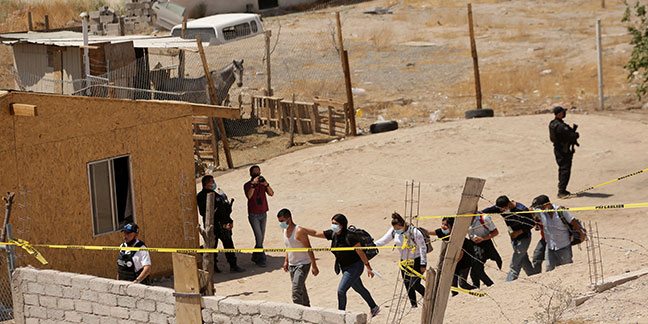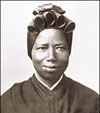 CHARLOTTE — Think slavery is a thing of the past, or that today it happens only in faraway places? Think again.
CHARLOTTE — Think slavery is a thing of the past, or that today it happens only in faraway places? Think again.
Modern-day slavery, or human trafficking, is happening right here in North Carolina.
State authorities report that 260 cases of trafficking came in to the National Human Trafficking Hotline in 2020, the latest numbers available. That places North Carolina ninth among the 50 states in cases reported. But because human trafficking is a crime that hides in the shadows, the actual number of cases is probably much higher.
“Major interstate highways, a large and transient military population surrounded by sexually oriented businesses, numerous rural agricultural areas with a high demand for cheap labor, and an increasing number of gangs all contribute to making our state a hotbed for human trafficking,” the N.C. Department of Administration explains on its website.
The severity of this issue right here at home impels us as Catholics to respond.
Eliminating human trafficking – modern-day slavery – is a priority for the Church because every life is a gift from God and is sacred. The Church sets aside Feb. 8 – the feast day of St. Josephine Bakhita, patron saint of trafficking victims – as a day to remember and pray for survivors and victims of modern-day slavery.
Trafficking is one of the deepest wounds inflicted upon our society. According to United Nations reports, nearly 40.3 million people are victims of modern slavery, of whom 24.9 million are entrapped in forced labor and sexual slavery and 15.4 million subjected to forced marriage. Through coercion, deceit or force, they are trapped in jobs and situations from which they cannot escape. And UN officials warn that the economic impacts of the COVID-19 pandemic are forcing more people into slavery – particularly children.
“Modern slavery, in terms of human trafficking, forced labor and prostitution, and organ trafficking, is a crime against humanity,” Pope Francis has said. “Its victims are from all walks of life but are most frequently among the poorest and most vulnerable of our brothers and sisters.”
Catholics and all people of faith are called to open their eyes to this pervasive, growing criminal industry.
It is often right in front of us: in massage parlors, nail salons and in the hospitality industry. It’s also found behind the scenes, on farms and in factories where our favorite goods and products come from. It also is present online, where vulnerable women and children are targeted, groomed and exploited by the pornography industry.
We each have a responsibility to fight against the violation and degradation of our brothers and sisters. Take part in National Human Trafficking Awareness Month activities, and commemorate the feast day of St. Josephine Bakhita. Host or attend prayer services and educational webinars, pray for victims and survivors, and learn how to spot the warning signs of human trafficking around you.
One such event coming up in the Charlotte area is a Human Trafficking Awareness speakers panel that will be held from 6:30 to 8:30 p.m. Friday, Feb. 25, at St.
Therese Church in Mooresville. Everyone is welcome to attend this event.
You can also go online to the U.S. Conference of Catholic Bishops’ website, www.usccb.org, to learn more about anti-trafficking awareness, download prayer resources and more.
Lastly, to report suspected human trafficking, call the National Human Trafficking Hotline and Helpline: 1-888-373-7888.
Kara Griffin chairs the diocesan Catholic Charities Human Trafficking Awareness Committee. To find out more information on how your parish can help the fight against human trafficking, contact her at This email address is being protected from spambots. You need JavaScript enabled to view it..
— Kara Griffin, Special to the Catholic News Herald
Who is St. Josephine Bakhita?
 On Feb. 8, the Church celebrates St. Josephine Bakhita and raises awareness of human trafficking.
On Feb. 8, the Church celebrates St. Josephine Bakhita and raises awareness of human trafficking.
Born in the Darfur region of Sudan in 1869, she was kidnapped as a child and sold into slavery. For the next 12 years she would be bought, sold and given away over a dozen times. She spent so much time in captivity that she forgot her original name.
She eventually ended up in the custody of the Canossian Sisters in Italy and came to know Christ for the first time. When she was called to return to her captor, she pleaded to stay with the sisters, who took her case to court. The court found that slavery had been outlawed in Sudan before Josephine was born, so she could not be lawfully made a slave. She was declared free, and chose to stay and join the Canossian Sisters.
Canonized in 2000, St. Bakhita is the patron of human trafficking victims. Feb. 8, her feast day, is the International Day of Prayer and Awareness of Human Trafficking.
— Jessica Grabowski. Catholic Online contributed.


